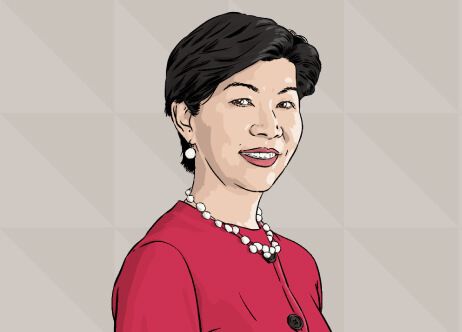The influential thinker and investor who coined the term "Womenomics" is now backing the country's most ESG-savvy start-ups.

Kathy Matsui
"The key to Japan's future is innovation and that, of course, can come partly from large, established companies," says Kathy Matsui, speaking from her home in Tokyo. "But if you look at most economies, innovation tends to originate more from start-ups, which are nimbler and more open to taking risks."
Matsui is one of Japan's key economic minds. In 1999 she invented the term "womenomics" – the title of her influential thesis on the participation of women in the Japanese economy – and later advised Shinzo Abe's government on how to better integrate female talent into the labour market. The California-born, Harvard-educated daughter of Japanese migrants to the US, Matsui moved to Japan in 1990 and eventually became Vice Chair and Chief Japan Strategist for Goldman Sachs Japan. In 2020, she left the firm to launch Japan's first ESG-focused global venture capital fund, the all-female-led MPower Partners.
"There are various definitions of ESG," says Matsui.
"But at its core, it encompasses principles that any company
at any stage of development should be mindful about. Good
governance includes caring about your employees' wellbeing, and
being mindful about the impact of your business and supply chain on
the environment." Matsui observes that these values must be at
the heart of the enterprise, rather than a peripheral, box-ticking
exercise. "A lot of investors, as well as young people, see
through that, frankly."
Matsui founded MPower Partners with two fellow finance leaders, Yumiko Murakami and Miwa Seki. "We had this common vision of how to create more impact in Japan, by opening more paths to innovation," she says. "We believe that integrating ESG considerations at an early stage of a company's development is the key to scalable and sustainable growth."
Bold new venture
The fund invests primarily in innovative tech start-ups in areas including sustainability, the future of work, and healthcare. "The potential demand for sustainability solutions, for instance, is massive and only going to grow," says Matsui, pointing to support from the Biden administration. The businesses she and her partners are working with include a Japanese start-up, Jeplan, that recycles PET bottles at scale, and another, Sukedachi, that matches construction workers to vacancies, with an Uber-style ratings system. Another is San Francisco-based Aclima, a leader in hyperlocal air-quality monitoring. There is no gender quota applied to the companies MPower Partners will work with but, so far, four of their 10 portfolio companies have female founders; Matsui cites research from both Japan and the US demonstrating how female-founded start-ups tend to outperform their male-founded equivalents.
She made the move to launch the fund after some enforced time spent
contemplating her life goals. "I was diagnosed with breast
cancer at the age of 36, right after I was promoted to partner at
Goldman, was ranked number-one equity strategist, and had my second
child. In other words, I was on top of the world," she says.
Her employer "bent over backwards" to support her, and
she took eight months off to undergo treatment. "Goldman was
my second family," she says. "But taking a step back
forced me to reassess priorities." While she returned to
Goldman following her leave, she eventually decided to step back in
2020 to launch MPower Partners in 2021.
Diverse workforces unlock talent
As a senior leader in Japan and in the financial services industry, Matsui is an extraordinary outlier. She credits some of her career success to having become an equity strategist in Japan in 1989, straight after the peak of the asset bubble period. "The economy was pretty horrific. Property and stock prices were collapsing. However, as an analyst, I probably couldn't have asked for a better environment. Clients don't necessarily need your advice when things are going well."
As she achieved success in a completely male-dominated industry, she began to develop her thesis. "In a demographically challenged society like Japan, are you fully utilising every human being? As the only female equity strategist in the Japanese market, I started to write about what I called 'Womenomics', and the benefits of incorporating more women into the workforce, focused on the impact higher female labour participation could have on GDP."
Japan has changed a lot since Matsui wrote her first Womenomics report. "In 1999, Japan's female labour participation rate was roughly 56 per cent, one of the lowest among developed economies," she says. "But by 2019 it had surged to almost 72 per cent, surpassing levels in the EU and United States."
There is still work to be done in Japan, with its wide gender wage
gap and still-low representation of women in leadership positions.
What's more, Matsui says, by midcentury, Japan's working
population is projected to shrink by 40 per cent. "That's
huge – how are we going to make up the shortfall?" she
asks. "Immigration is a possibility, but what about maximising
utilisation of the existing population? Women here are typically
very educated, but not working at the levels they could to fulfil
their potential. To me, that is a huge opportunity."
When it comes to the future of her fund, Matsui is clear about MPower Partners' goals. "We want to help prove the thesis that via greater diversity of thought and a more global mindset, start-ups born in Japan can become global and scale bigger." The partners seek out companies that they believe deserve "a bigger spotlight", then provide hands-on ESG integration support to take them to new heights.
If more organisations, not just in Japan but around the world, were to embrace the core principles of ESG, including diversity, what impact could it make? "That would really open the doors to much more creative, innovative businesses and working styles," says Matsui. "There are many potential avenues that can lead to a win-win situation, not only for the companies leading this change but also for society. So we're very excited about the opportunities that lie ahead."
The content of this article is intended to provide a general guide to the subject matter. Specialist advice should be sought about your specific circumstances.







